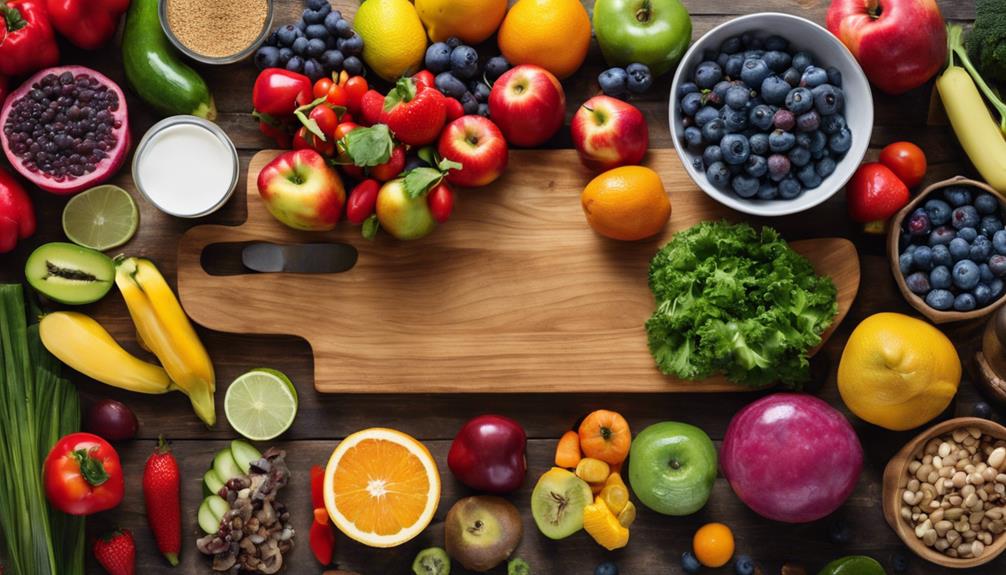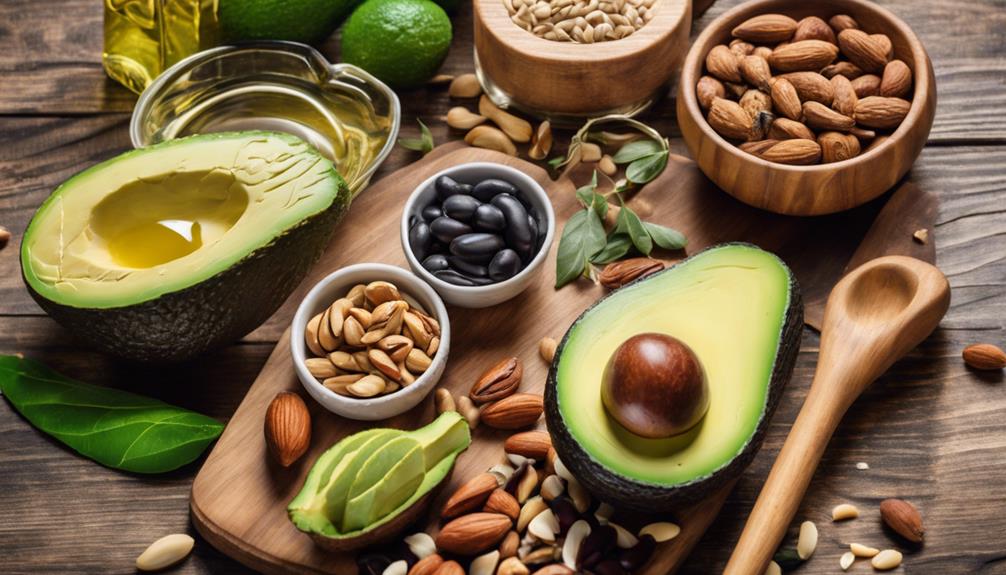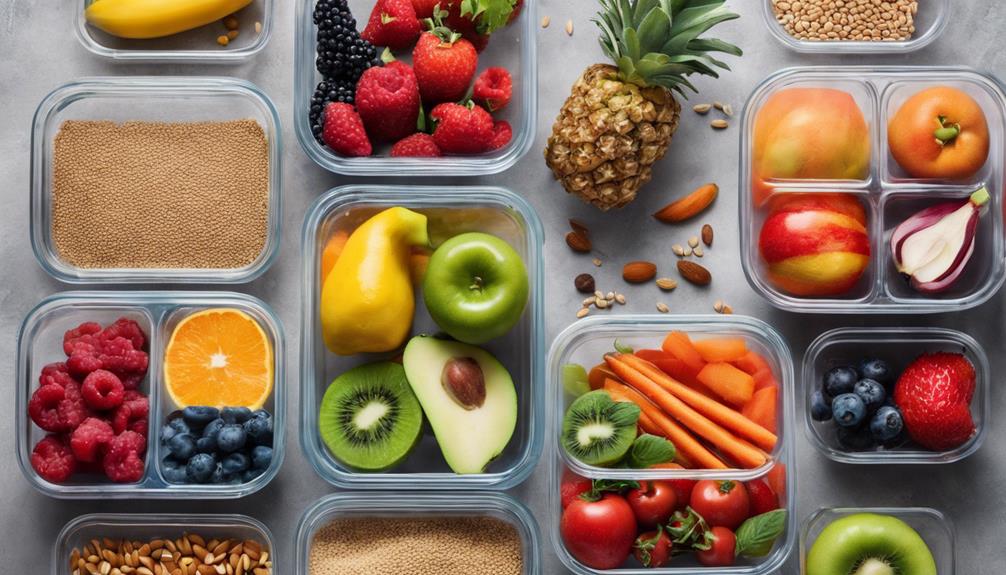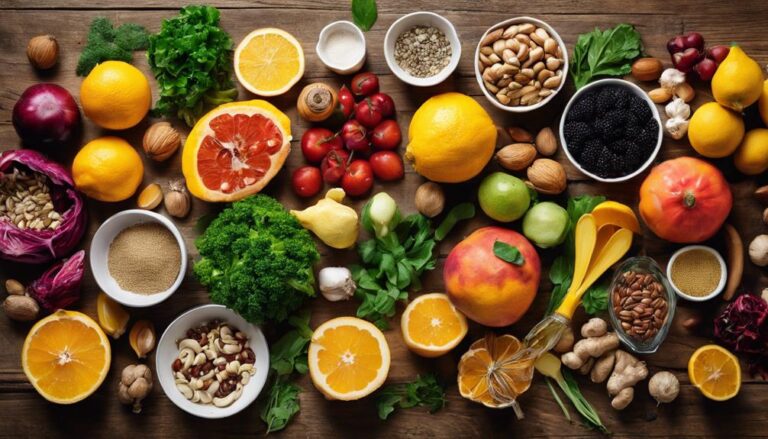Healthy Eating Tips for Women
When it comes to nourishing your body, think of food as fuel for a well-oiled machine. But are you truly giving your body the premium fuel it deserves? Ensuring you provide your body with the right nutrients can be a game-changer for your overall health and well-being. Let's explore some practical and achievable healthy eating tips tailored specifically for women, addressing key aspects like balanced nutrition, portion control, and mindful eating practices.
Key Takeaways
- Prioritize nutrient-dense foods for overall health.
- Incorporate lean proteins for muscle support.
- Include healthy fats like omega-3 for heart health.
- Practice portion control for balanced eating.
- Listen to your body's hunger cues for mindful eating.
Importance of Balanced Nutrition
Balanced nutrition is crucial for women to maintain overall health and well-being. Ensuring that your diet is rich in essential nutrients and maintains energy balance is key to supporting your body's functions and promoting optimal health. Nutrient density refers to the amount of essential nutrients in a food compared to the number of calories it provides. By choosing foods that are nutrient-dense, such as fruits, vegetables, whole grains, lean proteins, and healthy fats, you can fuel your body with the necessary vitamins, minerals, and antioxidants it needs to thrive.
Energy balance is another critical aspect of maintaining a healthy diet. Consuming the right amount of calories to support your daily activities and metabolism without overeating is vital for weight management and overall well-being. It's essential to strike a balance between the calories you consume through food and beverages and the calories you burn through physical activity to maintain a healthy weight and prevent health issues related to excess weight.
Prioritizing nutrient-dense foods and maintaining energy balance are foundational principles for women looking to support their health through balanced nutrition.
Portion Control Tips
For effective management of your diet and overall health, mastering portion control is a valuable skill. Mindful eating, focusing on portion sizes, is essential for maintaining a healthy weight and preventing overeating. When serving yourself, use smaller plates to help control portion sizes. This simple trick can prevent you from loading up on more food than your body needs. Remember, it's not just what you eat, but how much you eat that matters.
Another useful tip is to listen to your body's hunger and fullness cues. Eat slowly, savoring each bite, and stop when you feel satisfied, not overly full. It takes time for your brain to register that you're full, so pacing yourself can help prevent overeating.
Being aware of your portion sizes and eating mindfully can also help you enjoy your meals more and feel more satisfied with less food. By incorporating these practices into your daily routine, you can better manage your weight and overall health.
Incorporating More Fruits and Vegetables
To enhance your diet and promote optimal health, consider incorporating more fruits and vegetables into your meals. Fruits and vegetables are rich in essential vitamins, minerals, and antioxidants that are beneficial for your overall well-being.
One delicious way to increase your intake is by trying out different smoothie recipes. Blend together a variety of fruits like berries, bananas, and spinach with some yogurt or almond milk for a nutrient-packed and refreshing treat.
Another great option is to explore different salad combinations. Mix leafy greens with colorful vegetables, nuts, seeds, and a light vinaigrette dressing for a satisfying and wholesome meal.
Choosing Lean Protein Sources
When selecting protein sources for your diet, opt for lean options that provide essential nutrients without excess saturated fats. Choose plant-based options like beans, lentils, tofu, and edamame, which aren't only rich in protein but also packed with fiber and various vitamins and minerals. These protein alternatives can be versatile in recipes and beneficial for heart health.
Additionally, lean meats such as skinless poultry, fish, and cuts of beef like sirloin or tenderloin are excellent sources of protein. When preparing these meats, opt for grilling, baking, or broiling instead of frying to keep them lean.
Greek yogurt, low-fat cheese, and eggs are also great choices for lean proteins. Incorporating a variety of these lean protein sources into your meals can help you maintain a healthy weight, support muscle growth, and keep you feeling satisfied throughout the day. Remember, balance and moderation are key when it comes to choosing the right proteins for your diet.
Healthy Fats for Women
Incorporating healthy fats into your diet is essential for women's overall well-being. Omega 3 benefits found in healthy fats are particularly important for heart health, brain function, and reducing inflammation. Opt for nutrient-dense options like avocados, nuts, seeds, and fatty fish such as salmon and mackerel.
Including these healthy fats in your meals not only adds delicious flavors but also provides essential nutrients like vitamin E and omega-3 fatty acids. These nutrients are crucial for hormone regulation and maintaining healthy skin and hair.
When cooking, choose olive oil or coconut oil instead of saturated fats like butter. These oils are rich in monounsaturated fats, which can help improve cholesterol levels and support heart health.
Hydration Guidelines and Tips
As you focus on nourishing your body with healthy fats like avocados and nuts, it's equally important to pay attention to your hydration levels. Proper hydration is essential for overall health and well-being, especially for women. Maintaining electrolyte balance is crucial, as electrolytes help regulate various bodily functions, including muscle function and hydration levels.
Here are some hydration guidelines and tips to help you stay hydrated and healthy:
| Hydration Guidelines | Tips | Infused Water Recipes |
|---|---|---|
| Drink at least 8 cups of water | Carry a reusable water bottle with you | Cucumber and mint water |
| throughout the day | everywhere you go. | Lemon and ginger water |
| Ensure you drink more water | Set reminders on your phone to drink | Watermelon and basil water |
| during hot weather or intense | water regularly. | |
| physical activity. |
Staying hydrated not only supports your body's functions but can also improve skin health, digestion, and energy levels. Try incorporating different infused water recipes to make hydration more enjoyable and flavorful.
Mindful Eating Practices
To cultivate a healthier relationship with food and improve your overall well-being, practicing mindful eating can be a beneficial approach. Mindful eating involves being fully present and engaged while consuming your meals. By focusing on the sensory experience of eating, you can better tune into your body's hunger and fullness cues. Developing mindful eating habits can help you make more conscious food choices and prevent overeating.
Incorporating self-care practices into your meals can enhance the mindful eating experience. Prioritize creating a peaceful environment during meal times, free from distractions like phones or screens. Engage in deep breathing or a moment of gratitude before starting your meal to center yourself and promote relaxation.
Mindful eating can also aid in managing emotional eating and stress. By being more aware of your eating habits, you can differentiate between physical hunger and emotional cravings. This awareness allows you to address underlying emotions or stressors without turning to food for comfort. Practice mindful eating regularly to support your overall well-being and foster a positive relationship with food.
Reading Food Labels Effectively
To make informed decisions about your food choices, mastering the skill of reading food labels effectively is key. Label interpretation is crucial for understanding the nutritional content of the products you consume. Begin by looking at the serving size, as it impacts the rest of the information listed.
Next, check the total calories per serving and assess if it aligns with your dietary needs. Ingredient awareness is equally important; scan the list to ensure you're comfortable with what's included. Nutritional education plays a vital role in this process, empowering you to make choices that suit your dietary knowledge.
Developing dietary knowledge through label reading can help you maintain a healthy lifestyle. Pay attention to key nutrients like fats, sugars, and sodium, aiming for moderation in these areas. By honing your skills in label interpretation and ingredient awareness, you equip yourself with valuable tools for making mindful food choices tailored to your nutritional needs.
Meal Planning and Prep Ideas
For efficient meal planning and preparation, organizing your weekly menu can streamline your eating habits and save time during busy weekdays. Consider incorporating time-saving recipes into your meal plan, such as one-pot meals, sheet pan dinners, or make-ahead casseroles. These recipes allow you to prepare nutritious meals in advance, cutting down on cooking time and making healthy eating more convenient.
To make meal planning budget-friendly, focus on using seasonal produce, buying in bulk, and incorporating plant-based protein sources like beans and lentils. These options aren't only cost-effective but also packed with essential nutrients. Additionally, preparing meals in batches and utilizing leftovers creatively can help reduce food waste and save money in the long run.
When planning your meals, aim for a balance of macronutrients and include a variety of colorful fruits and vegetables to ensure you're getting a wide range of vitamins and minerals. By implementing these meal planning and prep ideas, you can simplify your eating routine, save time, and stay on track with your health goals.
Snack Ideas for Busy Women
Looking for quick and nutritious snack options to fuel your busy schedule as a woman? When you need a quick bite to keep you going, opt for energy boosters that will provide you with sustained energy throughout the day.
Consider snacks like Greek yogurt with berries and a sprinkle of nuts for a protein-packed and antioxidant-rich option.
Another great choice is a small handful of almonds paired with a piece of fruit for a balance of healthy fats and carbohydrates.
If you're in a rush, a protein bar or a nut butter packet with whole grain crackers can be convenient options to grab on the go.
These snacks not only provide the energy you need to power through your day but also offer essential nutrients to support your overall health. Remember, healthy snacking is an important part of maintaining your energy levels and keeping you satisfied between meals.
Eating Out Strategies
When it comes to maintaining a healthy diet, navigating restaurant menus can sometimes pose a challenge. To make smart choices when eating out, opt for restaurants that offer healthy menu items such as salads, grilled proteins, and vegetable-based dishes. Look for keywords like "grilled," "steamed," or "baked" to guide your selection towards healthier options. Additionally, consider sharing a meal or asking for a half portion to control portion sizes and reduce calorie intake.
Social dining strategies can also play a crucial role in maintaining a balanced diet when eating out. When dining with others, suggest sharing appetizers or desserts to enjoy a variety of tastes without overindulging. Encourage your dining companions to choose restaurants that offer a range of healthy options to support your dietary goals.
Listening to Your Body's Signals
Tuning into your body's signals is a fundamental aspect of maintaining a healthy relationship with food. By practicing mindful eating and intuitive eating, you can develop a deeper understanding of your body's needs and establish a more harmonious approach to nourishment. Mindful eating involves paying full attention to the experience of eating, without judgment or distraction. This practice allows you to savor each bite, recognize feelings of hunger and fullness, and make conscious choices about what and how much to eat.
To help you navigate the realm of mindful eating, consider the following table:
| Mindful Eating Tips | Description | Benefits |
|---|---|---|
| Engage your senses | Focus on the flavors and textures of your food | Enhances satisfaction with meals |
| Listen to your hunger cues | Tune in to your body's signals of hunger and fullness | Prevents overeating and undereating |
| Eat without distractions | Avoid multitasking while eating | Promotes mindful food choices |
Incorporating these practices into your daily routine can foster a healthier relationship with food and empower you to make more mindful and intuitive eating choices.
Frequently Asked Questions
Can Certain Foods Help Improve Hormonal Balance in Women?
Certain foods like leafy greens, fatty fish, and whole grains can aid in hormonal regulation for women. By supporting nutrient absorption and balance, these foods contribute to overall well-being and can positively impact hormonal health.
Are There Specific Foods That Can Boost Energy Levels Naturally?
Looking to naturally boost your energy levels? Have you tried incorporating superfood snacks and energy-boosting meals into your diet? Foods like nuts, seeds, leafy greens, and lean proteins can provide sustained energy throughout the day.
How Can Women Ensure They Are Getting Enough Vitamins and Minerals?
To ensure you're getting enough vitamins and minerals, focus on nutrient-rich foods like leafy greens, fruits, and lean proteins. Supplement options can help fill gaps, but aim to meet your needs through a balanced diet first.
What Are Some Healthy Dessert Alternatives for Women?
Craving a sweet treat? Opt for fruit salads or yogurt parfaits instead of traditional desserts. These options are delicious, satisfying, and packed with essential nutrients, helping you maintain a balanced and healthy diet effortlessly.
Is Intermittent Fasting a Suitable Option for Women's Health?
Intermittent fasting can be a suitable option for women's health, aiding in weight management and potentially improving menstrual health. However, it's crucial to consult with a healthcare provider to ensure it aligns with your individual needs and goals.
Conclusion
In conclusion, remember that a balanced diet is like a well-tuned symphony, with each nutrient playing a vital role in your health and well-being. By practicing portion control, incorporating colorful fruits and vegetables, choosing lean proteins, and embracing healthy fats, you can nourish your body and mind. Listen to your body's signals, plan and prepare nutritious meals, and make mindful choices when dining out. Your health is your greatest asset, so prioritize your well-being with smart food choices.















